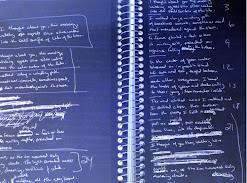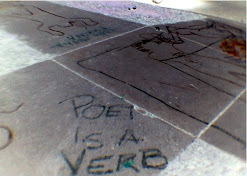Wednesday, January 31, 2007
Wasting Time #3 -- Not Sleeping
Posted by Jessica at 5:48 AM 0 comments
Labels: struggles, wasting time
Monday, January 29, 2007
"I Bid You a One-Man Revolution..."
Posted by Jessica at 8:13 PM 0 comments
Labels: famous writers
Sunday, January 28, 2007
#1 -- Friday Night in January, Uptown
like a murder of crows. High
heels slip on black ice.
Posted by Jessica at 5:55 PM 2 comments
Labels: 100 Haiku, formal poetry, Inspiration
Weekly Word Count, January 22-27
Only 600 this week. 5569 for the year.
I still have that short story I'm working on, but I decided to work on poetry instead. More time intensive, less words. Writing's writing.
Posted by Jessica at 5:52 PM 0 comments
Labels: New Year's Goals, Weekly Word Count
Bourgeois Poets Unite!
Posted by Jessica at 8:19 AM 0 comments
Labels: 9 to 5 life, working writers
Saturday, January 27, 2007
Twin Lives
Posted by Jessica at 8:06 AM 2 comments
Labels: 9 to 5 life, struggles
Thursday, January 25, 2007
Why I Love Poetry (or Why I'll Always Work 9 to 5)
because when I was little, I believed
thinking a word dreamt it alive.
because most mornings, I don’t want to.
but then, I see sunlight shining on snow
bounce and refract into hundreds
of shades of blue, and I do.
because syllables sing inside my skin.
because I opened a fortune cookie last month
which said, “You see beauty in ordinary things,”
and I agree. because
I tasted caviar for the first time last week
and the delicate eggs burst
like bubbles beneath my tongue
and it tasted like salt and dirt
the way my husband’s skin
tastes like salt and dirt.
because I counted every word of this.
because I listened to our president speak
tonight, and I was equally
afraid and awed
by the cadence and hum of his words. because
there is magnetism between
two bodies, two words. besides,
what else am I supposed to do
with all of this?
Posted by Jessica at 6:24 AM 7 comments
Labels: Poetry Thursdays
Wednesday, January 24, 2007
Goodbye Politics!
Posted by Jessica at 6:29 PM 0 comments
Labels: Politics and Writing, working writers
Monday, January 22, 2007
Retail Palace
Posted by Jessica at 8:34 PM 0 comments
Labels: Inspiration
Sunday, January 21, 2007
Weekly Word Count January 14-January 21
This week wasn't bad. I hit 1760, which isn't 3000, but is better than last week.
I am working on a new short story that I wished I had more time to write on this week. Perhaps next week, I can finish it up and achieve my word count goal.
Posted by Jessica at 8:21 AM 0 comments
Labels: New Year's Goals, Weekly Word Count
Saturday, January 20, 2007
Girls Write Too!
Posted by Jessica at 8:00 AM 0 comments
Labels: Politics and Writing, Publication
Thursday, January 18, 2007
They Cut the Same, You Know
I work at a culinary college teaching English & Literature, which can be invigorating or maddening, depending on how willing my students are to step outside of themselves. This poem is directly influenced by that experience, hence the knives and meat.
I was very pleased to find, after I wrote this poem of course, that the original author’s poem “Knives of Sorrow, Knives of Joy” also contain knife imagery. Great minds…
Primals
Most mornings, my students stand
at chrome tables, watching
an instructor lecture on primal
cuts of meat. Cold
carcasses lie before them,
white lines of fat glistening
against a field of blue, pink
and red. Knives in hand,
they go to work,
gently carving flesh from bone,
separating the choice
portions of meat from the gristle,
tenderloin, eye round,
flank and blade.
In my class, they slump in seats,
exhausted. I show them
a language, whole,
before slicing it into sections,
subject, verb, predicate,
modifier. Together,
we carve away,
removing the unsavory,
the spoiled, the over or under
used musculature of their words.
Their eyes glaze over, milky pools
of white. They say
they’re tired, they don’t understand.
They wield knives and I
wield words. I tell them,
they cut the same, you know.
Posted by Jessica at 6:38 AM 7 comments
Labels: Poetry Thursdays
Wednesday, January 17, 2007
My List of 30 Inspirations -- 26-30
Posted by Jessica at 7:48 PM 0 comments
Labels: Inspiration, Turning Thirty
Tuesday, January 16, 2007
My List of 30 Inspirations -- 21-25
Posted by Jessica at 8:23 PM 0 comments
Labels: Inspiration, Turning Thirty
Monday, January 15, 2007
My List of 30 Inspirations -- 16-20
Posted by Jessica at 8:56 PM 0 comments
Labels: Inspiration, Turning Thirty
The Full Monty
The prompt this week on Poetry Thursday is to post a line of your own poetry for someone else to incorporate in his/her own poem. I left the line "Lonely as traffic jams," from this poem.
This poem was the result of an exercise in grad school where we modeled a poem after another writer's poem. It's been so many years, but I believe this poem was modeled after an Al Young poem about a place he lived, but I cannot find it online. :)
Los Angeles/A Screenplay
I too
once lived
in this city
bare feet hopscotching
over melting asphalt,
jumping over
almost visible
heat waves
gray ocean devouring
discarded broken
bottles, tiny
toes, brown sand
castles
avenues lined with palm tress ten stories high
all bowing
towards the setting
sun
moonlight upstaged
by glittering streetlights
and 100's of cars
slowing to a stop.
Lonely as traffic jams,
I lived there too.
Posted by Jessica at 8:43 AM 0 comments
Labels: Poetry Thursdays
Sunday, January 14, 2007
Weekly Word Count January 8-14
I could have a lot of excuses for this week... first week of the term, responsibilities after work several nights this week, one of the kitties had to go to the vet. But the truth of the matter is, I just didn't sit down to write much this week. The week just slipped through my fingers.
So I only have 500 words this week. Total for the year: 3209.
I'll look for less excuses and more time next week.
Posted by Jessica at 9:23 AM 0 comments
Labels: New Year's Goals, Weekly Word Count
My List of 30 Inspirations -- 11-15
Posted by Jessica at 7:49 AM 0 comments
Labels: Inspiration, Turning Thirty
Saturday, January 13, 2007
My List of 30 Inspirations -- 6-10

Posted by Jessica at 3:44 PM 0 comments
Labels: Inspiration, Turning Thirty
Publication Opportunity for the Unpublished Masses
Posted by Jessica at 8:10 AM 2 comments
Labels: Publication, Technology and Writing
Friday, January 12, 2007
My List of 30 Inspirations -- 1-5
Personally, I'm not having even close to the same response. I thought I would be panicking, but I'm almost serene. I'm planning my celebration and (in my short bursts of free time) contemplating my life. So, in that vein, I'm going to list (in no particular order) the 30 things that inspire me & feed me as a writer.
Posted by Jessica at 6:28 AM 0 comments
Labels: Inspiration, Turning Thirty
Wednesday, January 10, 2007
Letting the Cat Out of the Bag
Welcome to paradise, he said to me,
as I stamped my feet in the cold. No shit,
I muttered underneath my breath,
wondering what we really meant.
I watched the digital numbers on the gas pump
accumulate, illuminate, as I waited to go home.
Ten hours later, warm at home, lying
in bed, I am still wondering, trying
to catch 40 winks,
one at a time. They flutter
through my finger tips on eyelash
soft wings. I count them,
like sheep, mouthing the numbers in the dark.
I think about him, talking to me,
clutching the dripping squeegee, slamming it
into the pool of murky blue
water. He walks to the entrance,
talks to the girl in the purple miniskirt
and yellow tights.
I follow them inside.
Welcome to paradise,
he says to the clerk, who hands him
a carton of cigarettes and a case of beer. Welcome
to paradise, he says to the suit,
paying for gas and condoms
on his AmEx. Welcome to
paradise, he says to the teenage boy
unloading the case of candy bars
in the aisle, aligning the red wrappers.
I circle the store, distant
and cold in my pajamas, and make my bed
on a stack of yesterday’s USA Todays.
I wrap myself in gray words
and blurred pictures, the print rubbing off
on my skin. I count my winks,
one by one, as they escape my grasp,
wondering if sleep will ever come home.
Posted by Jessica at 7:27 AM 12 comments
Labels: Poetry Thursdays
Monday, January 8, 2007
Wasting Time #2 -- Blurred Boundaries
I think that other people (those magical other people whose houses are clean and lives are orderly) have this part figured out. They can work their jobs, come home, put their jobs away, and focus on their real lives. I wonder how they manage to do that at all. While I try to figure it out, I'll just focus on repairing those boundaries, between my work and my real life, after stretching them much too thin.
Posted by Jessica at 8:49 PM 2 comments
Labels: struggles, wasting time
Sunday, January 7, 2007
Weekly Word Count January 1-7
Posted by Jessica at 8:55 AM 0 comments
Labels: New Year's Goals, Weekly Word Count
Saturday, January 6, 2007
Why Can't We Have Television Like This?
Posted by Jessica at 8:57 AM 0 comments
Labels: linguistics
Wednesday, January 3, 2007
Libraries -- the New Wal-Mart?
Posted by Jessica at 6:33 PM 0 comments
Monday, January 1, 2007
Politicians Who Piss Me Off #2
Posted by Jessica at 9:42 AM 0 comments
Labels: Politics and Writing
Politicians Who Piss Me Off #1
Posted by Jessica at 9:26 AM 0 comments
Labels: Politics and Writing
























